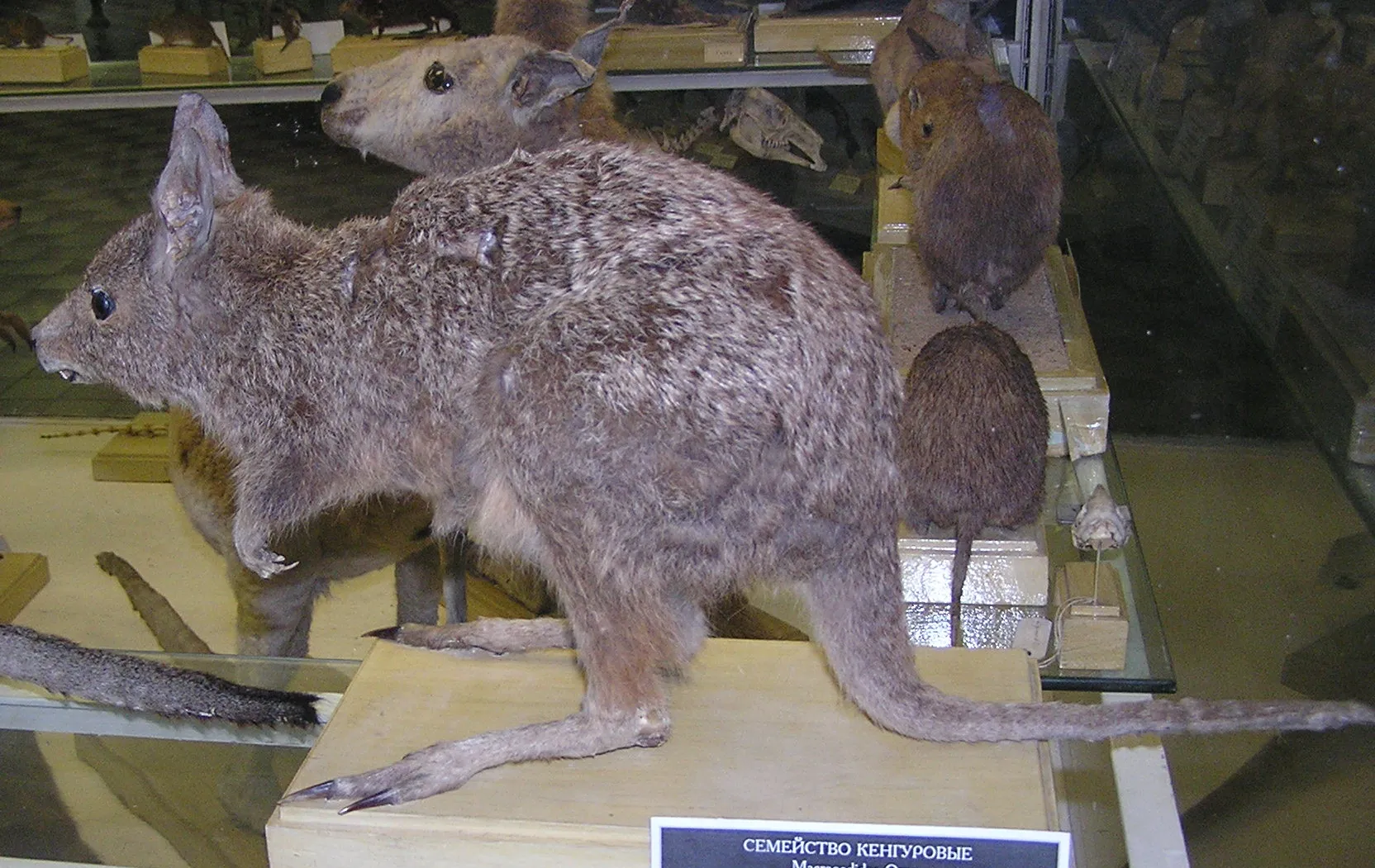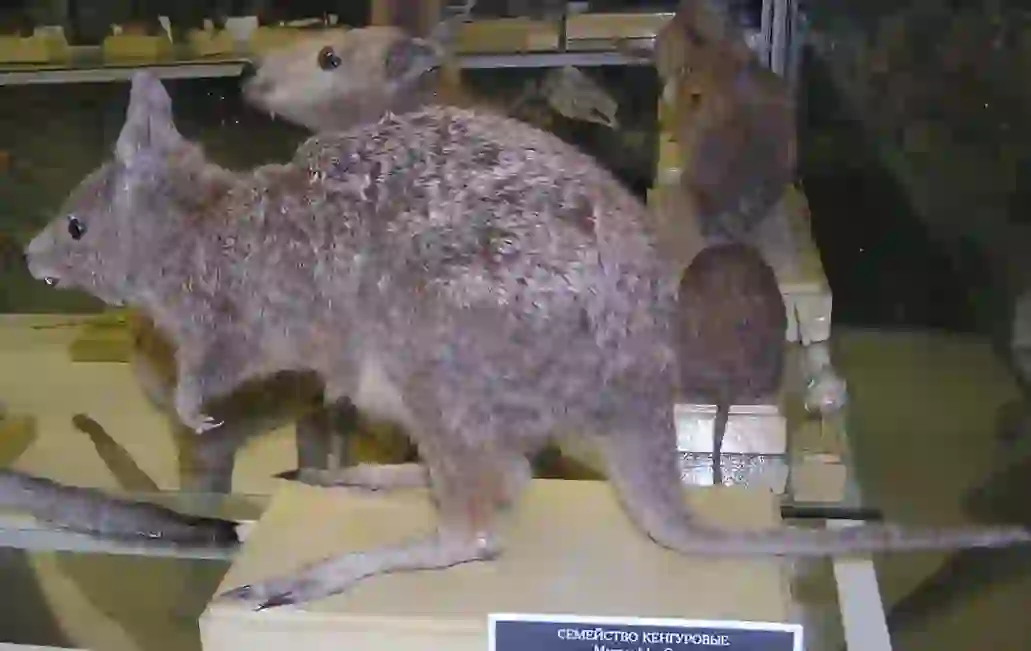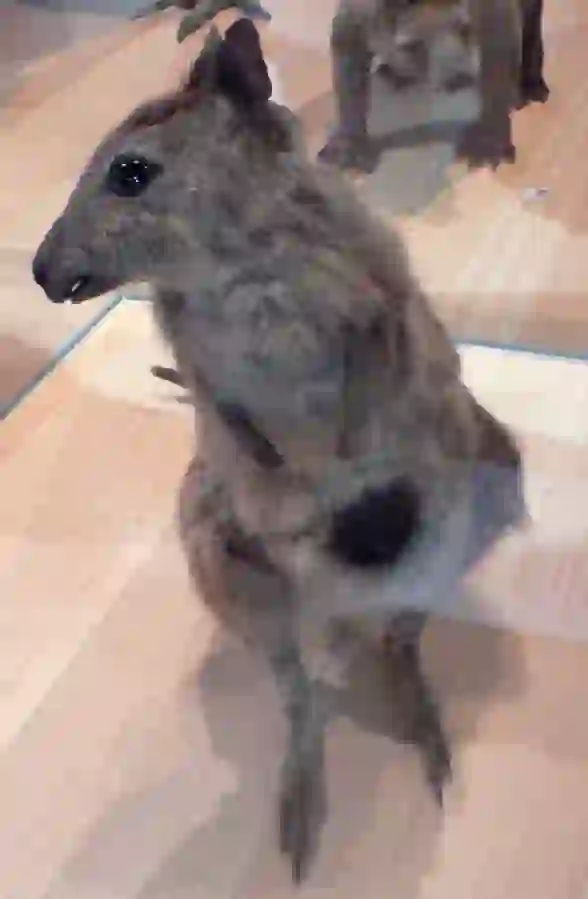
Eastern Hare-wallaby
Eastern Hare-wallaby
Eastern Hare-wallaby
The eastern hare-wallaby, a small kangaroo that once hopped like a rabbit across the grasslands of Australia. These endearing creatures, with their long ears and slender bodies, vanished from Earth in the late 19th century. Let's unravel the mystery surrounding the extinct eastern hare-wallaby and retrace their journey through history.
Eastern Hare-wallaby Basic Infomation

| Property | Value |
|---|---|
| Scientific Name | Lagorchestes leporides |
| Taxonomic Status | EXTINCT |
| Rank | SPECIES |
| Vernacular Names | Eastern Hare-wallaby |
| Kingdom | Animalia |
| Phylum | Chordata |
| Class | Mammalia |
| Order | Diprotodontia |
| Family | Macropodidae |
| Genus | Lagorchestes |
| Habitats | Formerly grasslands of southeastern Australia (before extinction) |
| Conservation Status | EXTINCT (EX) |

Size
They were about 16 to 20 inches (40 to 50 centimeters) in length, with tails about 14 to 16 inches (35 to 40 centimeters) long. They weighed about 3.3 to 5.5 pounds (1.5 to 2.5 kilograms). They were one of the smaller wallaby species. Males are thought to have been slightly larger than females.

Lifespan
Their lifespan in the wild is estimated to have been about 8 years.

Distribution
They were once widely distributed in the grasslands of southeastern Australia, including New South Wales, Victoria, and South Australia. However, they are believed to have gone extinct around 1890.
Eastern Hare-wallaby Q&A

What kind of wallaby was the eastern hare-wallaby?
The eastern hare-wallaby was a species of wallaby belonging to the genus Lagorchestes.
As their name suggests, they hopped like rabbits. In English, they are called 'eastern hare-wallabies.' 'Eastern' refers to their distribution in eastern Australia, and 'hare' refers to their rabbit-like hopping gait. They had grayish-brown fur, long ears, and a slender build. They were nocturnal and solitary, grazing on grasses and seeds. They were very shy and would quickly hide in the bushes when they sensed danger, making them difficult to observe. As a result, much about their ecology remains a mystery.

What did eastern hare-wallabies eat?
Eastern hare-wallabies were herbivores, and primarily ate grasses, seeds, and fruits.
They lived in dry grasslands and are believed to have been adapted to survive with minimal water intake. This is because they could obtain moisture from the plants they ate. They also conserved water by concentrating their urine.

Why did they go extinct?
The cause of the eastern hare-wallaby's extinction is not entirely clear.
However, several factors are thought to have contributed to their demise:
・Habitat loss: European settlers cleared vast areas of grasslands for agriculture and livestock grazing, destroying the eastern hare-wallaby's habitat.
・Impact of introduced species: Introduced species, such as foxes and cats, preyed on them and competed with them for food.
・Disease: Diseases introduced by humans may have also played a role.
The extinction of the eastern hare-wallaby is a stark reminder of the impact human activities can have on the natural world.

[Quiz!] When did the eastern hare-wallaby go extinct?
The eastern hare-wallaby is believed to have gone extinct around 1890.
However, there have been a few unconfirmed sightings since then, suggesting that they may have survived until the 1930s. However, none of these sightings have been confirmed, and the exact date of their extinction remains a mystery.

[Quiz!] Were eastern hare-wallabies kept in zoos?
Eastern hare-wallabies were kept in zoos in Australia and Europe in the 19th century.
However, animal husbandry practices were not as advanced back then, and many eastern hare-wallabies died from diseases and stress. As a result, there are no zoos that currently have eastern hare-wallabies.

[Quiz!] Can the eastern hare-wallaby be resurrected?
In recent years, there has been progress in research on resurrecting extinct animals using biotechnology.
However, resurrecting the eastern hare-wallaby is considered highly unlikely. This is because there is very little of their DNA (deoxyribonucleic acid) left. DNA carries the genetic information of an organism. If DNA information is available, extinct animals can be resurrected using cloning technology. However, since very little DNA information remains for the eastern hare-wallaby, resurrecting them is extremely difficult.

Would you like to become a part of the 'Animalbook.jp'?
Turn your knowledge into Q&A and share it with the world. ※Publication will be activated after purchase. Let's share information together!
Eastern Hare-wallaby Type of List

Closely Related Species of the Eastern Hare-wallaby
- Rufous Hare-wallaby (Lagorchestes hirsutus)
- Spectacled Hare-wallaby (Lagorchestes conspicillatus)
Information
Congratulations! You are the first commenter!

Create Your Favorite List!
Eastern Hare-wallaby
Save the animals you love! Build your own list to quickly revisit your favorites later.

Would you like to leave a comment?
※Please note: This is for the purchase of rights to post comments within the article.
Find Your Favorites!
Our shop offers a unique and attractive selection of goods themed around various animals.
Eastern Hare-wallaby References
Eastern Hare-wallaby Introduction of media used

Andrew Butko, CC BY-SA 3.0, via Wikimedia Commons

From Wikimedia Commons, the free media repository

Help Enrich Our Animalbook.jp with Your Media!
We are constantly looking to expand and enrich our Animalbook.jp with amazing photos and videos of animals. If you have any media that you'd like to share, please contribute and help us showcase the beauty and diversity of the animal kingdom. Your submissions will be credited and featured in our encyclopedia, reaching a wide audience of animal lovers.


















